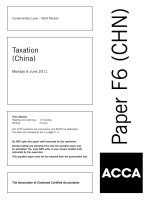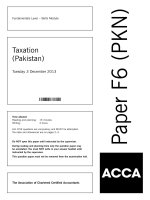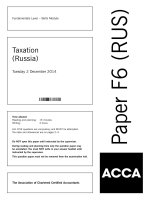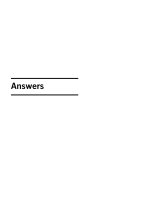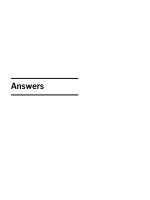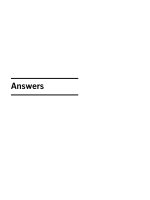ACCA f6 taxation vietnam 2011 dec answer
Bạn đang xem bản rút gọn của tài liệu. Xem và tải ngay bản đầy đủ của tài liệu tại đây (137.91 KB, 7 trang )
Answers
Fundamentals Level – Skills Module, Paper F6 (VNM)
Taxation (Vietnam)
December 2011 Answers
and Marking Scheme
Marks
1
(a)
Fortune-4ever Ltd
(i)
Depreciation expense – car
Purchase price before VAT (1,540 million/1·1)
Non-deductible input VAT as paid in cash, being deductible
expense for CIT (1,400 * 10% * 50%)
Registration fee
Total costs to be capitalised
Depreciable amount (capped)
Depreciation expense (1,600 million/5)
(ii)
Depreciable
VND million
1,400
Non-depreciable
VND million
1
70
300
––––––
1,770
––––––
1,600
320
1
0·5
1
0·5
–––
4
–––
Depreciation expense – finance leased machine (Article 4.3 Circular 203)
Depreciable Non-depreciable
VND million
VND million
400
50
–––––
450
–––––
Cost (outright purchase price)
Installation costs
Total depreciable costs
Depreciable period (5 years from 1 July 2010 to 30 June 2015)
Depreciation expense (450 million/5 years * 6/12)
1
1
1
1
–––
4
–––
45
(iii) Distribution expenses
Deductible
Invoice discount
1,500
Cash discount
Costs of goods for promotion campaign
Commission for sales force
2,000
Payment discount
Market research costs
300
Overseas tours for distributors (not related to business)
Promoters hiring (a form of support costs for
advertising and promotion)
Booth rental at festivals
600
Display fees
1,200
Support costs to distributors
Conference organising
Sample products for customers (60% borne by
Fortune)
––––––
Total
5,600
––––––
17
Subject to
10% cap
Non-deductible
100
400
250
2,500
200
1
0·5
0·5
1
1
350
650
240
––––––
2,090
––––––
0·5
0·5
1
0·5
1
0·5
1
––––––
2,600
––––––
1
–––
10
–––
Marks
(b)
VCM JSC
Corporate income tax (CIT) payable for the year ended 31 December 2010:
Taxable income
VP project – [600,000 –
400,000 + 20,000]
Other projects – [200,000 –
240,000]
Real property transfers – [500,000 –
350,000]
Other income (working 1)
Offset between activities
VP project
Other projects
VND million
VND million
Transfer of
real property
VND million
Other income
VND million
220,000
1
(40,000)
0·5
150,000
36,000
(36,000)
36,000
4,000
(4,000)
Real property transfers are accounted
for separately – no offset
Taxable income after offset
216,000
Losses carried forward 2009
(40,000)
Losses transferred (from other projects
to VP project)
(45,000)
Taxable income after losses carried
forward
131,000
Tax rate
Exempt
Tax payable
0
Remaining losses carried forward
0
0
(45,000)
0
150,000
(10,000)
1
0
0
45,000
0
0
0
0·5
3
1
1
2
1
140,000
25%
35,000
0
0
0
0
0·5
0·5
–––
12
–––
Working 1 (W1) Other income
Items
Waste disposal loss
Net unrealised foreign exchange gain from payables –
[50,000 – 30,000]
Net unrealised foreign exchange gain from translation of receivables
[5,000 – 3,000]
Gain from securities trading
Net interest income – [3,000 – 2,000]
Total
2
Taxable/
(deductible)
(10,000)
Non-taxable/
non-deductible
0·5
20,000
0·5
2,000
25,000
1,000
36,000
1
0·5
0·5
–––
3
–––
30
–––
Ms Hanh
(a)
Family deduction
–
Children who satisfy one of the following conditions:
–
–
–
–
below 18 years old; or
above 18 years old but handicapped; or
study in university or high school; and having no income or having an average monthly income of
less than VND0·5 million per month.
1
1
1
A spouse who satisfies one the following conditions:
–
–
out of working age without income or having an average monthly income of less than
VND0·5 million per month, or
within working age but handicapped and having an average monthly income of less than
VND0·5 million per month
18
1
1
Marks
–
Parents who satisfy one the following conditions:
–
–
(b)
out of working age without income or having an average monthly income of less than
VND0·5 million per month, or
within working age but handicapped and having an average monthly income of less than
VND0·5 million per month
1
–––
7
–––
Ms Hanh’s family deductions (VND1·6 million per month * 12 months = VND19·2 million per qualified
person per year plus VND4 million per month * 12 months = VND48 million self relief):
Person
Self relief
Son
Daughter
Amount
VND million
48·0
19·2
19·2
Husband
Ms Hanh’s mother
Ms Hanh’s father
Total
(c)
1
19·2
19·2
0·0
––––––
124·8
––––––
Explanation
Per regulations
18 years old but studying
Studying in high school with an income less than VND6 million
(0·5 million * 12 months)
Out of working age and has no income (value of assets is not income)
Out of working age and has no income (remittance is to her husband’s
name)
Out of working age but has remittance income
0·5
1
1
1
1
0·5
–––
5
–––
Personal income tax liabilities for the year 2010
Items
Salary
Performance bonus
Tuition fee for first child (USD20,000 x 21,000)
Tuition fee for second child
Private car (120 million * (20% + 30%))
Gym membership (567 million/3 years/3 partners)
Tax accountant costs (cannot be allocated to
specific person)
Loyalty gift – tour costs paid to travel agent
Additional costs in US (not borne by firm)
(a)
(b)
(c)
(d)
(e)
(f)
Total gross taxable income before housing
Housing benefits
–
15% of gross income
–
Actual housing (31·5 million * 12 months)
(k)
Taxable housing
(g)
(h)
(i)
(l) = k * 15% 453,150,000
(m)
378,000,000
––––––––––––
(n) = min(l,m)
(o) = k + n
Amount
VND
1,300,000,000
600,000,000
420,000,000
378,000,000
60,000,000
63,000,000
–
200,000,000
–
––––––––––––––
3,021,000,000
1
1
1
378,000,000
––––––––––––––
3,399,000,000
1·5
1·5
Total employment income
Insurance [(13 million * 4 months + 14·6 million
* 8 months) * (6% + 1·5% + 1%)]
Deduction (from part (b))
(p)
(q)
Annual assessable employment income
(r)
Monthly average
Monthly tax payable
(Income * 35% – 9·85 million)
Annual tax payable
(s) = r/12
(14,348,000)
(124,800,000)
––––––––––––––
3,259,852,000
––––––––––––––
271,654,333
(t) = pit(s)
(u) = t * 12
85,229,017
1,022,748,200
19
0·5
0·5
1
1
2
1
1
–––
13
–––
25
–––
Marks
3
HNSN
(a)
Consequences of having a permanent establishment (P/E) in Vietnam
Even if the project constitutes a P/E of HNSN in Vietnam, it does not mean that HNSN will automatically be
required to declare and pay corporate income tax (CIT) and value added tax (VAT) as a subsidiary/branch of
HNSN in Vietnam.
2
The CIT regulations refer to the concept of a P/E and state that a foreign company having a P/E is subject to
CIT in Vietnam, but is silent on how the foreign company files for tax in Vietnam.
1·5
According to the foreign contractor tax (FCT) regulations, HNSN can select the tax filing method, i.e. it is a
choice, not a requirement, so HNSN can use the deemed method if it wishes to do so.
2
Only if HNSN selects to file tax under the actual method will its tax filing obligations be similar to a company
incorporated in Vietnam.
1
A further potential disadvantage of using the actual method is that if HNSN files tax under this method for the
current project, then it would also have to use the actual method for any subsequent projects it undertakes in
Vietnam.
1·5
According to the double tax treaty (DTA) between Korea and Vietnam, as the project constitutes a P/E of HNSN
in Vietnam, it would not be entitled to a CIT exemption for the business profits attributable to the P/E under
the DTA.
1
–––
9
–––
(Note: credit would be given to other appropriate answers)
(b)
Foreign contractor tax (FCT) using the deemed method
Items
Net contract
amount
USD
Corporate
income
tax (CIT)
tax rate
1%
2%
5%
Machinery and equipment
80,000,000
Construction and installation (10 – 8)
2,000,000
Other services (7 + 4 + 1·2 + 0·5)
12,700,000
Total revised contract price/CIT portion
VAT charged by local sub-contractor
(non-recoverable) (8 * 10%)
Total tax costs
Gross contract
amount [Net/
(1 – CIT rate)]
USD
80,808,081
2,040,816
13,368,421
96,217,318
CIT
(Gross – net)
USD
808,081
40,816
668,421
1,517,318
800,000
2,317,318
1·5
2
2
1·5
–––
7
–––
Note: credit is also given to answers with Construction and installation at 5% CIT as highest rate for the
combined activities, for which the values of each activity are not separable.
(c)
Foreign contractor tax (FCT) using the hybrid method
Items
USD
Corporate income tax (CIT) payable
As in part (b) above
Value added tax (VAT) payable
Output VAT (7 + 10 + 4 + 1·2 + 0·5) = 22·7 * 10%
Input VAT charged by local sub-contractor (non-recoverable) (8 * 10%)
VAT payable
Tax amount
USD
1,517,318
2,270,000
(800,000)
––––––––––
1
1
0·5
1,470,000
––––––––––
2,987,318
––––––––––
HNSN is correct in thinking that the hybrid method will result in lower tax costs to them (i.e. USD1,517,318
v USD2,317,318 million), because the VAT portion of the FCT will be collected from AHN JSC.
20
1·5
–––
4
–––
20
–––
Marks
4
(a)
(i)
Types of invoices to be issued
Case 1: Company A must issue a VAT invoice to Company B.
Case 2: Company A must issue an export invoice to Company C.
Case 3: Company D should issue a sales invoice to Company A (a foreign exchange trader must use the
direct method for foreign exchange trading).
Case 4: Company E should issue a special invoice (international air freight receipt) to Company A.
Case 5: The tickets themselves will be invoices, if they have been registered as such with the authorities.
(ii)
1
1
1
1
1
–––
5
–––
Allowable forms of invoices
A self-printed invoice, which is printed by the taxpayer from their own computers, cash registers or other
machines upon the sale of goods or provision of services.
1
An electronic invoice, being a collection of electronic data on the sale transaction which is created,
handled, stored and managed under the regulations on Electronic Transactions.
1
A printed invoice which is either:
–
–
(b)
an invoice printed by order of the taxpayer in accordance with a format (registered by the taxpayer)
for the sale of goods or provision of services; or
an invoice printed by order of the tax authorities to distribute or sell to the taxpayer.
1
1
–––
4
–––
Situations where settlement is deemed to have been made via a bank
Settlement is deemed as being made via a bank where:
(i)
(ii)
the value of goods and services purchased is offset with the value of goods/services sold to the same
party (or ‘bartering’), if this is provided for in the contract;
1
the value of goods and services supplied by the seller is offset with a debt that the seller is owing to the
buyer, if this is provided for in the contract; and
1
(iii) the buyer authorises a third party to pay the amount due via a bank to the seller, if this is provided for
in the contract.
(c)
1
–––
3
–––
Input value added tax (VAT) implications
(i)
(ii)
Input VAT on a fixed asset being a building used as the head office of a life insurance company is not
deductible for VAT purposes, but is added to the cost of the building for corporate income tax (CIT)
purposes.
1
Input VAT on the villa destroyed by fire is not deductible for VAT, and is not added to deductible expenses
for CIT purposes as in this case the total cost including the VAT is covered by the insurance company
compensation.
1
(iii) Input VAT on the villa sold to the CEO at a significant discount is deductible in full as it is treated as a
normal sales transaction by the company. There are no CIT implications.
Tutorial note: the company must calculate the output VAT based on market value (this was not asked for in
the exam).
21
1
–––
3
–––
15
–––
Marks
5
Mai Hoang Co
Corporate income tax (CIT) filing obligations
Mai Hoang Co
Dependent manufacturing
Dependent sales offices
(part of central
Mai Hoang Co return)
Ho Chi Minh City subsidiary
Dong Nai subsidiary
Purchase of 49% of
Quang Ninh subsidiary
Types of return
Quarterly
30 April 2010,
30 July 2010,
30 October 2010,
30 January 2011
Same as
Mai Hoang Co
N/A
and dates of submission
Annual
One-off
31 March 2011
N/A
Tax authority
Same as
Mai Hoang Co
N/A
N/A
Hanoi and
Vinh Phuc
N/A
Same as
Mai Hoang Co
30 July 2010,
30 October 2010,
30 December 2010
30 April 2011
N/A
Same as
Mai Hoang Co
30 June 2011
N/A
N/A
11 December 2010
N/A
N/A
Hanoi
Ho Chi Minh
City
Dong Nai
Province
Quang Ninh
2·5
1
1
1
2·5
2
–––
10
–––
22
